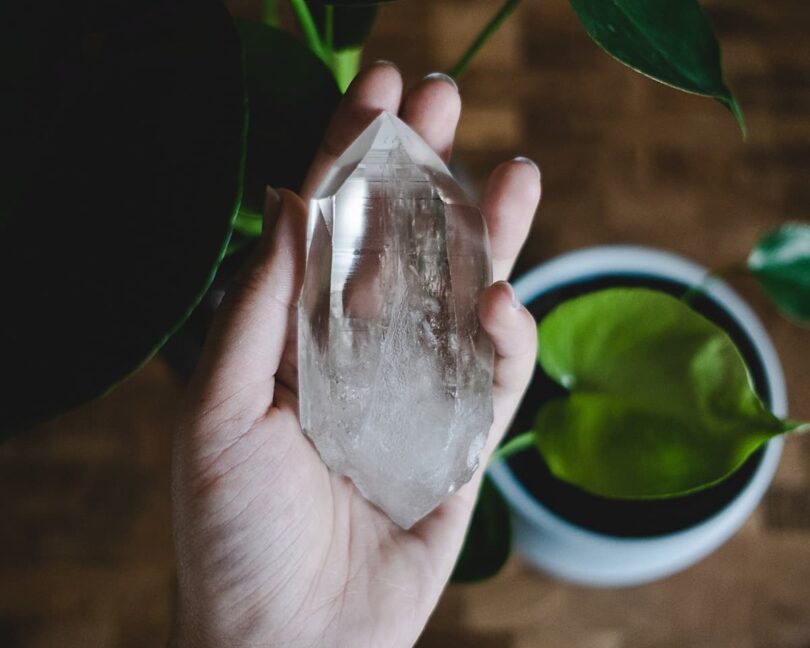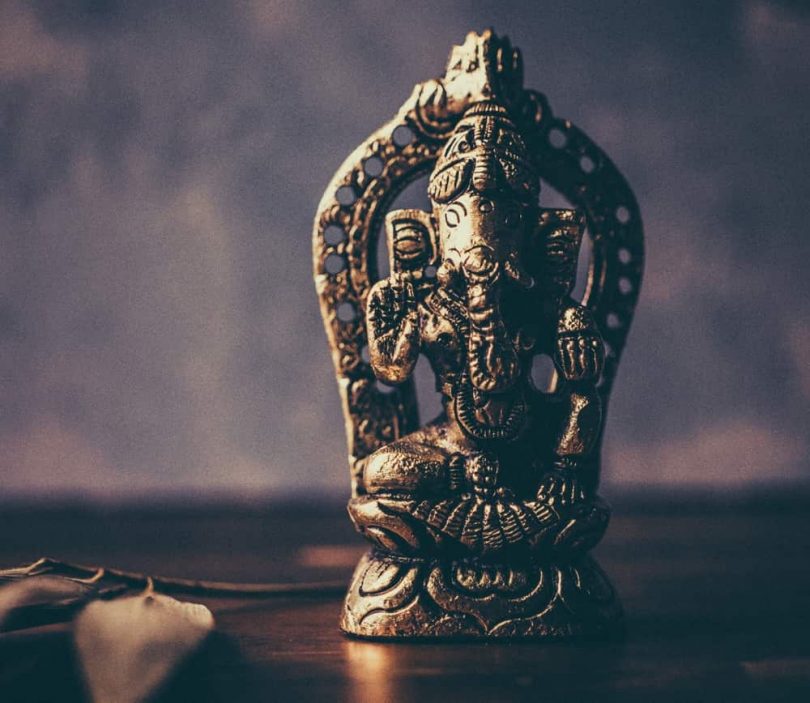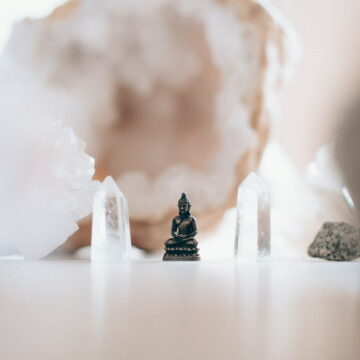Let’s be real for a moment:
there comes a time when our spiritual practices harm us more than help us.
Yet most of us are so invested in protecting our fragile egos from the truth, that we live in a state of denial or total oblivion to what is happening.

Spiritual Wanderer Course:
⭐️⭐️⭐️⭐️⭐ "I started the Spiritual Wanderers Course a short while ago and for the first time in twelve years I have started to experience love, acceptance and compassion for myself and within myself. Thank you so much." – Vivienne S.
When our spiritual practices reinforce, bolster, and underhandedly inflate our senses of self (i.e., our egos), this is called spiritual materialism. And it’s a toxic form of spirituality.
Table of contents
What is Spiritual Materialism?

Originally coined by Buddhist meditation master Chögyam Trungpa Rinpoche in his book Cutting Through Spiritual Materialism, spiritual materialism is what happens when we use spiritual concepts, practices, and tools to reinforce the false sense of self, the ego.
As the ego is the source of all our suffering, bolstering the ego through spiritual practice is totally at odds with the whole point of the spiritual path.
As Trungpa writes,
No matter what the practice or teaching, ego loves to wait in ambush to appropriate spirituality for its own survival and gain.
All of us, without exception, need to be honest with ourselves and realize that we aren’t immune to falling into the trap of spiritual materialism. We all have an ego and its mission is to survive, no matter what it takes (including misusing spirituality!).
Why do our egos go to such extremes as to “appropriate spirituality” for their own gain? The answer is that our egos are primal defense mechanisms that both help us to survive in our environments, and will also do anything they can to avoid non-existence or annihilation.
Yet the irony is that the dissolution of the ego – or rather than awakening out of the ego – is the central message of the awakening journey of Self-realization or spiritual enlightenment.

Shadow & Light Membership:
⭐️⭐️⭐️⭐️⭐ "Straight from the very first weekly email, this has been mind-blowingly powerful, the synchronicity and the on-vibe contents resonate uncannily with my soul’s current challenges." – Marie
So how do we know when our egos have slipped into spiritual materialism? We’ll explore that next.
Examples of Spiritual Materialism

There’s a mess inside you: You clean the outside.
― The Dhammapada
Examining our own paths and practices closely, most of us will be able to find instances of spiritual materialism quite easily. All we have to do is ask, “How is this belief/practice/tool reinforcing the ego (the separate sense of self).”
The deeper we look, chances are, the more instances of spiritual materialism we’ll find. But the point is not to be judgmental of our behavior but to practice mindfulness and be compassionate with ourselves.
The best way to learn is often through our mistakes which is what teaches us humility, spiritual discernment, and greater self-awareness.
But often, it can be hard to turn an objective eye on ourselves and our behavior. Sometimes, it’s best (and preferable!) to learn from the examples and behavior of others.
Here are four common examples of spiritual materialism that can often be found in the spiritual marketplace of life:
- “Owning” and indirectly claiming special status due to certain gifts (e.g., clairvoyance, ability to read auras, communicate with spirits, etc.) which reinforces the separate sense of self or ego.
- Literally buying into the spiritual marketplace, e.g., chasing after endless workshops, methods, tools, trinkets, and techniques that all promise to make you a wiser, more intuitive, more blissful, or more “spiritual” person.
- Practicing meditation with the hidden agenda of trying to avoid suffering by becoming peaceful or detached all the time (when the reality is that thoughts and feelings are always fluctuating like the ebb and flow of the ocean – the point isn’t to bypass or “kill” the mind, but to stop identifying with its contents).
- Using the law of attraction to try and attract all of your desires (because that would supposedly “make you happier” than being grateful for what you already have).
… and the list goes on.
Now comes the space to pause and reflect. Can you recognize any of this behavior within yourself?
It takes deep humility to admit where we’ve gone astray or have been misguided in our thinking and behavior. However, being willing to be vulnerable, open, and honest about ourselves is a central part of the spiritual awakening path.
(By the way, here’s a quick video about spirituality and its relationship with consumerism itself to go a bit deeper into this topic from another angle:)
Would you like to save this?
Your information will never be shared.
11 Signs You’re Falling into Spiritual Materialism

Spiritual materialism is an attachment to the spiritual path as a solid accomplishment or possession. It is said that spiritual materialism is the hardest to overcome. The imagery that is used is that of golden chains; you’re not just in chains, you’re in golden chains. And you love your chains because they’re so beautiful and shiny. But you’re not free. You’re just trapped in a bigger and better trap. The point of spiritual practice is to become free, not to build a trap that may have the appearance of a mansion but is still a prison.
– M. Caplan
The ultimate question we’re seeking to answer in this article is, “Have you fallen into spiritual materialism?”
It’s a tough, confronting, and even scary question to consider – but it is so necessary!
Please don’t worry or feel bad about yourself if you’re hesitantly raising your hand and accepting that, yes, you have fallen into spiritual materialism – we all have to some extent! No one is perfect.
The reality is that taking an honest look at ourselves is an important part of our innermost shadow work: it helps us to avoid stumbling, falling, and getting sidetracked again in the future. It might be painful to admit that we’ve been spiritually materialistic, but it’s damn important work.
Here are the eleven crucial signs of spiritual materialism to pay attention to:
1. Spiritual elitism
I.e., using spiritual ‘achievements’ (like having a kundalini awakening) or one’s ‘gifts’ (like being able to channel or heal others) to disconnect from and feel superior to others.
2. Cultural appropriation
I.e., using other cultures’ specific words, practices, or ways of life for one’s own profit/self-image (while simultaneously trivializing them).
3. Creating a spiritual resume
I.e., keeping a list of all the important spiritual people, workshops, certifications, etc. that one has achieved to impress oneself and others.
4. Spiritual shopping sprees
I.e., habitually buying spiritual trinkets/tools/items or accumulating the blessings and initiations from sages, shamans, saints, etc., to somehow feel more “special,” “awakened,” “aligned,” or spiritually worthy.
5. Future obsession
I.e., believing that “if I do ___, I will get to this special elevated state in the future” without living in the present moment or recognizing the fundamental ego-centricity of this driving belief.
6. McSpirituality
I.e., seeking out spiritual practices/teachers that are always bigger and better and who promise “instant joy/abundance/bliss/enlightenment” and quick fixes (often seen in the new age movement).
7. Focusing only on the positive
I.e., so that the ego avoids the reality of its own shadow (that is, its hidden pain, wounds, and deceptions), it focuses on the purely positive aspects of spirituality, aka., “Think positive thoughts,” “be high vibe,” “love and light,” “good vibes only,” etc. Focusing only on the positive is a major aspect of spiritual bypassing (or avoiding our issues by escaping into spirituality).
8. InstaSpirituality
I.e., focusing on aesthetically-pleasing spiritual practices that are “Instagram-worthy” while neglecting the deeper and messier aspects of spiritual transformation that can’t fit into a pretty picture.
9. Hollywood spirituality
I.e., rather than honoring the ordinary magic of everyday life, one seeks lights-and-glamor spirituality and supernatural experiences like angelic visitations, seeing visions, meeting UFOs, spirit guides, teachers with ‘extrasensory’ abilities, etc.
10. Self-improvement addiction
I.e., one flits around from teacher to teacher and practice to practice in search of becoming “more healed,” spiritually awakened, etc., not realizing that by constantly trying to self-improve, one is never happy and is continually reinforcing the illusory ego that feels broken.

Spiritual Awakening Bundle:
⭐️⭐️⭐️⭐️⭐ "Luna & Sol, your words have been like salve to my soul. I have been searching for a way to heal and reconnect to my true self for so long (20 years) but have never found anything that truly made a difference… Until I read your books." – Stac
11. Spiritual narcissism
Spiritual narcissism is the climactic result of spiritual materialism; that is, the ego becomes so big, so bulletproof, that it not only unconsciously believes it’s more “awakened” than others, but it will do anything to reinforce that “specialness,” including harming others through arrogance and megalomania.
Wowza … this is a confronting list, no?
Let’s sit with these eleven signs and be honest with ourselves. How many can you relate to?
As we can see, spiritual materialism is what occurs when spirituality feeds the ego – when we take something Divine and try to possess it as our own: when we are fuelled with ego-centric motives. Again, we all have this tendency, so there’s nothing to be ashamed of – we just need to be more aware of this seductive inclination.
How to Stop Spiritual Materialism

The reality is that so long as we’re still attached to our egos, there will always be some level of spiritual materialism on our paths creeping in here and there.
Until that moment of sacred recognition – the moment where we shift from the ego to Oneness, Non-Dual Awareness, Cosmic Consciousness, or whatever you like to call it – the ego will inevitably find ways of using spirituality to bolster its existence.
How do we stop spiritual materialism? We can find moments of liberation, discernment, and greater perspective through practices such as:
- Journaling and self-reflection
- Shadow work and developing awareness of our shadow self
- Self-inquiry and contemplation
- Meditation and mindfulness
We can also seek guidance and opinions from trusted friends, spiritual advisors, or mentors. Simply asking the question, “In what areas might I be deluding myself?” can go a long way in helping us be free of self-deception by practicing spiritual discernment.
So tell me …
What is your experience with spiritual materialism? Are there any other types I haven’t listed in this article? Please share below!
Three paths to inner transformation – here’s how I can help you go deeper:
1. The Spiritual Wanderer Course: Are you feeling lost, adrift, and unsure of your life's purpose? Gain clarity, focus, and direction on your inner path by uncovering the five archetypes of awakening within you. Learn how to navigate the highs and lows of your inner journey and chart your unique path with 3+ hours of audio-visual content, workbooks, meditations, and a premium test.
2. Shadow & Light Membership: Do you crave consistent support on your spiritual quest? Receive weekly intuitive guidance and learn to embrace your whole self, including your shadow side. Cultivate deeper self-love with our affordable, personalized support.
3. Spiritual Awakening Bundle: Ready to embark on a profound soul-searching adventure? Dive into our collection of essential transformative resources! Explore five illuminating eBooks and seven in-depth journals, plus unlock two special bonuses to empower your spiritual growth.






Thanks for writing this helpful post, Luna!
These actions resonated most with me: number 5 (Thinking “If only I do __ practice, I’ll get into an elevated state) and number 10 (going from practice to practice to try and become “more healed”). I now see that these tendencies make sense, as self-worth and self-esteem have been tender, wound-filled personal areas for me. I’m thankful that this is changing though!
Thank you for your honesty and authenticity in sharing this Evelyn! I can definitely relate to falling into these practices as well (many times). Self-awareness is key though!
I am addicted to self-improvement and got stuck badly on my journey. When I decided to detox on all psycho-spiritual input including lonerwolf for a long while, I finally got better and unstuck. Now, I have to learn how to consume mindfully and I started by reading this article. Synchronicity?? With love and gratitude to you.
I agree with much of what you are saying, but not to throw the baby out with the bathwater, iv e so much fun and great learning experiences whilst on the new age path.
OK, there was spiritual arrogance etc, but there were a lot of things that made me a better person, enriched my life and kept me sane! Better to be addicted to spiritual searching, than many other addictions, I have been guilty as charged, but what part of life doesn’t involve the ego!
That said,
“Better to be addicted to spiritual searching, than many other addictions,” – yes, I agree with you there. :)
Well said!
I definitely love my crystals and incense and bath salts seasoned for each day of the week, LOL! Maybe I have experiences in the bath, or maybe there’s just something in there to get me stoned ! I don’t *depend* on them, though. I *enjoy* using it, and I think I benefit from having regular practices or rituals in place.
I guess I’m wondering if it’s pathological to use these things in general, or if it’s a particular way that people use them that makes it pathological.
I’m definitely into the mystical mumbo jumbo. I also think it’s something anybody can do, so at least I don’t suffer from elitism.
I have a mentor who encourages me to believe many things that take a lot of audacity to believe, and I think that it is an individual thing concerning some of my own self esteem issues. Not really sure what else to think about it.
“I guess I’m wondering if it’s pathological to use these things in general, or if it’s a particular way that people use them that makes it pathological.” – good question. To me, it’s the way we approach them which makes it an issue. ;)
Your answer is a bit ambiguous. In what approach makes, using tools (crystals, incense, etc.) let’s say, pathological?
I just recently found your website, I am extremely interested, and agree with most of what I have read so far. And enlightened in many ways. Especially with the shadow work. The mix of psychology and spirituality is very intriguing, in a good way.
I agree that we need to see and use the magic we already have within us and around us. Nature in many ways is magical in itself. The magic within us really is self realization, self-love, and mostly being honest with yourself. When you use your ego in a positive way, you can become one with yourself. But it is easier said than done.
An example is when I had a crushed vertebra, I used my ego to say, you will be better at this than anyone ever has. I was walking a day and a half after my accident. It wasn’t until I added crystals to my meditation did I actually fuse that vertebra to the one above it. The doctor said it happens but it is uncommon. I did not tell him what I did. But he was surprised when he saw it.
Thank you for sharing this article. I am experiencing a good practice with the dichotomy of “to have” and “to be” (as formulated by Fromm in his book To have or to be). Whenever I insist to have, to reach s., to gain etc. I have immediately a feeling comming from ego-centered behaviour and have chance to transform that by leaving it into experience like just go through it, just doing it, just to be…
This is one of your best articles.
Having lived around Glastonbury (which I described to a friend as an ‘esoteric scrapyard’), I think that your 11 points have pretty well nailed spiritual materialism for what it is.
I tend to think that if one cannot discover or actualise ‘spirituality’ via introspection or self-reflection without resorting to (external) paraphernalia, then it will always be elusive.
But if you can sense the Sun or Moon smiling upon you and can smile in return, or if you can feel the elemental embrace of the storm wind and embrace it in return, or if you can stand in awe and wonder at the opening of the first blossoms of spring, or even more simply feel gratitude towards all of the people, factors and circumstances that have gotten you to the very point in life where you stand (even the bad ones: yes, it can be difficult to accept (let alone embrace) the adversity that has helped you to be so strong), then you are probably on the right path.
It is often at our point of greatest vulnerability or weakness that we find our greatest strength, which comes from within; and no technique or initiation or ritual or box of tricks or bag of crystals can give us this.
Thank you.
I bless the ground that you walk upon and the air that you breathe, as you surely do.
Perfect! Absolutely spot on. Spirituality is inside us. Anytging else is just props and window dressing. There’s no harm in that, but it’s not necessary in order to actually be ‘spiritual’
Interesting write-up useful and sensible. It appears Aletheia Luna may have fallen into the same ‘trap’ she is asking others to avoid; that is, advertising credentials about this so-called “spiritual awakening” as a result of apparent “existential crisis”. It’s understandable for marketing reasons, which is fine. All good wishes.
great article. I instantly recognized my mother in a lot of these signs. I was raised to focus only on “love and light”. What ended up happening is when I needed to deal with a lot of my pain I was always told to see it in love and forgive. I was told that only be in a state of love and light and not to focus on the darkness because it was “low vibration”. This was of thinking landed me in a mental institution on some serious drugs. I became severely depressed because I was never taught how to cope. I always looked up to my mother and believed she was some kind of guru. When I got older I realized that she did not have all the answers. I don’t blame her because I feel she did the best she knew how to do. I have since really worked on myself and I am following my purpose. I had to be alone to do so and get away from outside influence, but I am so much better for it.
Thank you for sharing this Stacy <3
I loved this. I think I have been spiritually materialistic in the past, and now as I’m going through a spiritual awakening I’m being cautious to not slip back into it. I do have a question. I’d like to have some reiki to help with some needed physical/ emotional/ mental healing. Would that still be spiritual materialism? Or is it when I become reliant on the practice to “feel better” versus working through it?
Hi Amber. Reiki is fine – but depending on it to make you feel better (and giving away your power to the reiki practitioner in the process) starts entering the shadow territory. We all need help and guidance from others, but whether that guidance helps or hinders us lies in our own intention.
I love this article so much … I used to be caught in this and I’m so grateful that I was able to get out (knock on wood :)) … seriously though, it is so important to be conscious and honest with yourself and one’s motives because one can get sucked into things like that very easily anytime.
Thank you for writing this article and bringing the awareness … it is such a gem <3
Thank you, Barchi. <3
Amen.
I think if we’re honest we all have or may at some point fall into spiritual materialism. It may in fact be a necessary thing for some of us to experience in order to evolve. The important thing is that we check in with ourselves. I realized at some point along my journey that everyone’s truth is Their truth, not mine. Their experiences are theirs, not mines. And while other people’s truths, experiences, and guidance can be useful- it is not coming from me. Self-inquiry is the best inquiry. Going within oneself will always trump spiritual materialism. For me, the idea of constant positivity and being surrounded by people who seemed to always be happy and ignore any emotions that they didn’t seem to be positive, was more detrimental for my growth. I had to realize that we give our emotions and experiences labels. What appears to be bad or wrong all depends upon one’s perception. When I stopped trying to label my emotions and experiences or allow others to, I realized everything just is and it is my mind that seeks to analyze, categorize, and label my emotions and experiences.